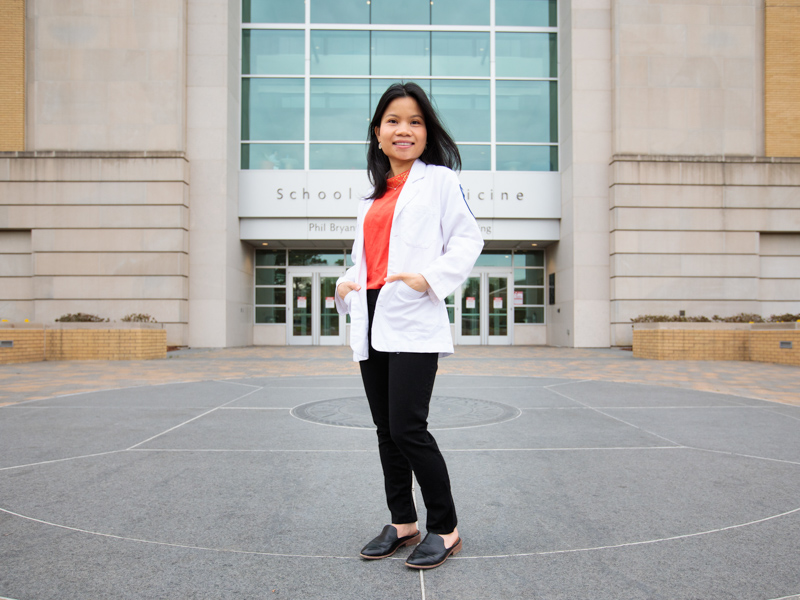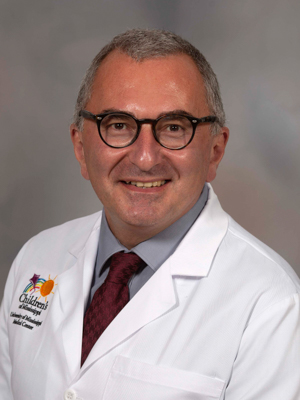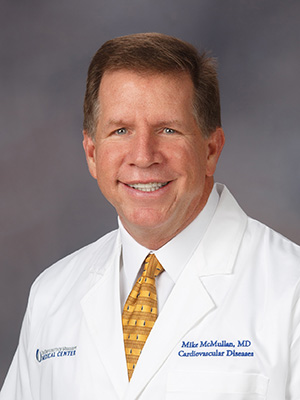#UMMCGrad2021: SOM grad’s heart for children shaped by faces of pain

Phuong Le was just 7 or 8 when the assurances of childhood began to crumble.
It started in a place she thought of as a safe place, a “child’s heaven”: a city market in Vietnam filled with toys and beautiful clothes, a paradise that dissolved into a nightmare when she saw the beggar girl with the bulging eyes.
She had an enormous head; shortened limbs; oddly shaped fingers; and cleft lips – which “curved up into a smile,” Le said, when Le’s mother put some money down.

As Le would soon learn, the girl in the market was destined to be poisoned in her body long before she was born, or even conceived, because of something called Agent Orange. “It was the first time I saw human pain and suffering,” she said, and the memory that pursued her over the years was one of the reasons she, in turn, pursued a medical degree.
On May 28, Le will be one of around 135 medical students to take the stage at the Mississippi Trade Mart and receive their degrees, all carrying with them memories that impelled them there – and to the School of Medicine at the University of Mississippi Medical Center.
It is safe to say that most have lived in the United States all of their lives; Le, a native of Hue, Vietnam, came to America 13 years ago, when she was 14.
In that time, she graduated from high school in Olive Branch, where her family had moved to be near their relatives in Memphis who had moved there two decades ago. It had taken Le’s immediate family – mom, dad, sister, brother – years to complete the paperwork that enabled them to emigrate from Vietnam, she said.
In that time, she also graduated from Rhodes College in Memphis, then moved to Jackson to go to medical school.
Her encounter with the girl in Hue’s marketplace was one of “the puzzle pieces” she had assembled to form the big picture: her future caring for children.
The war in Vietnam had ended about two decades earlier, but its imprint on the country’s people was still visible on the faces and bodies of many, including the young.
“I wasn’t sure what was wrong with them,” Le said. “They just looked really scary to a little girl. I would see not just one or two children, but five or six with similar defects at the same time.
“There were a lot of documentaries about the Vietnam War on TV; I saw stories in newspapers, too. That’s how I learned the cause.”
Agent Orange is an herbicide sprayed from the air by the U.S. military during the war to destroy vegetation that might feed, and hide, enemy forces.
It has caused long-term health problems among U.S. military veterans and their children, as well as birth defects in Vietnamese children born in the aftermath of the war: conjoined fingers or toes, missing or underdeveloped chest muscles, malformations of the face and skull, spina bifida and more.
To a girl Le’s age at the time, pain and suffering became a visible part of life in Vietnam, but certainly it was not part of life in America – a “place full of dreams and no suffering,” she thought. She was not long in America when that dream, too, began to fade.
Her father, now a warehouse worker, had been laid off from his job. As a teenager, Le usually went with her parents, Khuynh Le and Gina Nguyen, on doctors’ visits so she could translate for them. They had to go to a doctor in Byhalia, about 40 minutes from their home.
“It was the only place where they could afford health care at the time,” she said.

At the clinic, Le would see a lot of patients; they reminded her of something she had seen in Vietnam: “The same line of people waiting for doctors.” This was another piece of the puzzle.
But it was nothing compared to what she saw at St. Jude’s. Le was in college at Rhodes when she volunteered to work in the children’s hospital.
Sometimes the patients she met were very frail, she said. “I would see them striding along the hallway with their IV pole.”
They were always glad to see Le and the Happy Cart, which she pushed around on each floor. It was full of toys and games, and she helped the children pick them out. She gave them superhero stickers, too, and they delighted her with their smiles.
But some told her they did not feel well enough to play. Le realized many had spent their entire lives in the hospital.
“I was able to do things a normal kid can do: go to school, have fun with friends, have time with my family, go on summer vacation -- things that kids in a hospital might not have the opportunity to do. At that moment, I realized children can have illness at any age, not just in Vietnam, but also in America.
“I realized they can grow cancers and be sick at a very young age. It’s something they don’t choose to have, but they try to fight it. Some don’t make it through the fight.”
And there was her experience with the boy trying to be Spider-Man – another puzzle piece, and the last one she would need.
Le, who was still in college, trying to decide between a career in “science or medicine,” was shadowing pediatricians at Le Bonheur Children’s Hospital. During that time, she met the boy in a neurology clinic – hopping around like his favorite superhero, while his mother, nearby, cried.
“This boy seemed to be happy and healthy,” Le said, “but then I heard his mother’s story. She said he had been abused by his father.
“I realized then that doctors do more than just give medicine. Being a pediatrician also means making sure our patients are safe at home.”
Within a few years, Le plans to be doing just that. She has been accepted for her residency training at the University of Tennessee Health Science Center in Memphis, in the area that saw the end of her childhood and innocence.

“I am very happy for her. She will make all of us proud,” said Dr. Ali Onder, who met Le when she did a clinic rotation, an elective, with him.
“The thing I like most about her is, not only that she was always earlier than I was whenever we were going to meet, it’s also that she never had anything else that she needed to do or go to, during all our meetings or rounds. I felt she was 100 percent there, always.
“I don’t think that’s a common thing nowadays. She will do very well, and will be a good, caring physician.”
She has shown her caring side to many faculty members here, but there is a side of her that many may not know, said Dr. Mike McMullan.

“She enjoys listening to music, not just in English or in Vietnamese, but also music in other languages,” said McMullan, professor of medicine and division director of cardiology at UMMC.
“I believe this shows how open she is to different experiences, and how her heart goes out to others,” said McMullan, who is also associate dean for Student Affairs in the School of Medicine.
“She has always had a love for understanding others, and she certainly has the heart to be an excellent pediatrician. She is a delight.”
Le says she wants to understand her patients by learning their stories, the way she learned the story of the girl and Agent Orange, and the story of the abused boy who coped through his superhero dreams.
She wants to know how they and their stories change as they grow older. She wants to watch them grow older. “I know some who saw the same doctors until they were adolescents or even in college,” she said. “You develop a special bond with them.
“I love that as soon as they are well, they get out of bed. They come in very sick and then you see them get better, day by day. They are brave and don’t complain. They surprise us with what they can do.”


